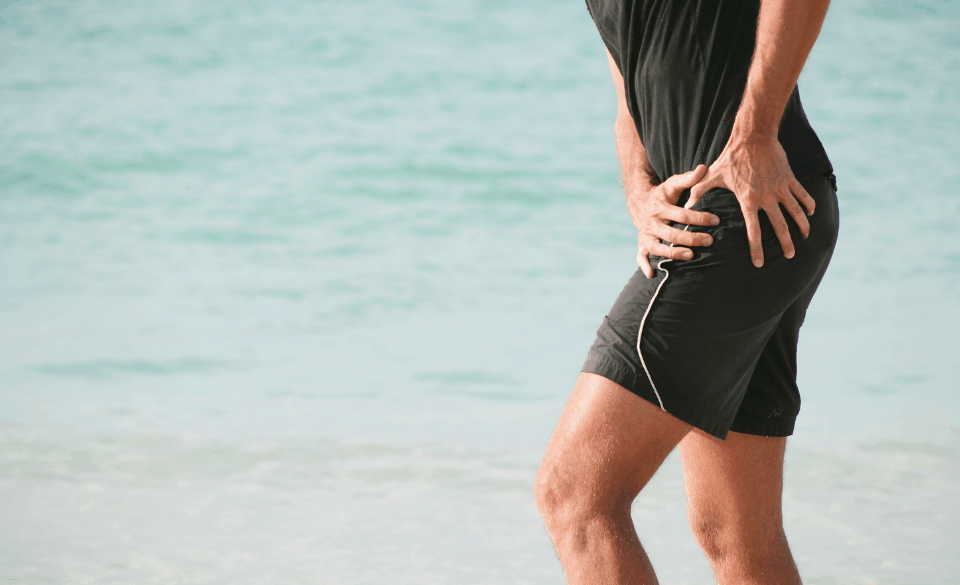
Hip Pain from Running – What Causes it? How Do You Prevent It?
Page Contents
Hip pain during and after a run is becoming more and more common. Runners are pushing their bodies harder and harder in the hope of making greater improvements. Unfortunately, because of this, many people experience hip pain from running, both during and afterward. So what can you do about it? And how do you prevent hip pain before and after running?
Keep reading to find out what may be causing your hip pain and how you can recover and prevent it from happening.
What Causes Hip Pain When Running?
If you experience pain in your hips, you may be wondering what causes hip pain when running.
First and foremost, it is recommended that you travel to a physical therapist or doctor before self-diagnosing yourself. They can run clinical tests and find out what is causing your hip pain.
Alternatively, if you do not have access to a physical therapist or sports doctor, you may be suffering hip pain caused by one of the following:
Bursitis: Fluid-filled sacs located near joints can become inflamed around the hip. Excessive force or repetitive motions (such as running) are largely to blame for an inflamed Bursae. Bursitis is generally a painful condition that can cause swollen, painful and stiff joints. However, it can not just affect you around the hip, but the shoulders and elbows as well.
Tendinitis in the Hip: One of the most common hip injuries when running. Tendinitis in the hip is usually caused by increased mileage or increasing the intensity too quickly. This often results in the tendons around the hip becoming inflamed, painful, and tender.
Incorrect technique and running on hard surfaces can also increase the risk of tendinitis and hip pain from running.
Muscle strain: A strained or pulled muscle caused by overuse can often result in pain around the hip. Largely caused by an incorrect warm-up and tight hip muscles. So remember to warm up thoroughly as it will help prevent the risk of muscle strains.
Femur Stress fracture: Not as common as the other injuries, a stress fracture in the hip still affects many runners. Largely caused by increasing the mileage and overuse, these runners develop a tiny crack in the hip bone from running. Most of the time the stress fracture occurs around the neck of the femur and is more likely to happen if you have osteopenia or osteoporosis. Also, marathon runners or runners generally running high mileage are more susceptible to developing stress fractures.
Osteoarthritis: A type of arthritis caused by wear and tear. Osteoarthritis is caused by the cartilage in the joint breaking down. This caused the runner to experience pain, swelling, and stiffness. Often affecting the person’s daily routine. However, a doctor can help reduce the discomfort. Thus helping to manage pain and improve the person’s mobility.

How Do You Prevent Hip Pain From Running?
So, with all this talk about hip pain, how do you prevent hip pain from running? The simple answer is to prevent yourself from overtraining or increasing your mileage too quickly.
Overuse and repetitive motions are the most common cause of hip pain when running. However, there are a few other things that can help prevent hip pain during and after running.
Strength training: Strength training twice a week can help strengthen your core, hips, abdominals, quadriceps, hamstrings, and hip flexors. Thus increasing the body’s ability to handle the repetitive forces of running. Just remember to split apart your strength training days from hard sessions, such as intervals, long runs or tempo workouts.
Gait Analysis: Whether or not you deal with a sore or painful hip from running, it is important to still get your running form checked. A gait analysis can help spot things like overstriding, muscle imbalances, and excessive impact. The trained professional can then recommend some running drills and strengthening exercises to help improve your biomechanics.
Running in the Correct Shoes: Running in the correct shoes will not only help prevent such things as over-pronation but will also help absorb impact when your feet hit the ground. This in turn will help keep your biomechanics in line and prevent excess force traveling up to the hips.

How to Relieve Hip Pain From Running
Both ice and foam rolling are some of the quickest ways to relieve hip pain from running. Foam rolling should be performed 2-3 times per week, as this will help keep your muscles supple and relaxed. However, if you find you are experiencing pain in the hip after a run, foam rolling can help relieve any discomfort caused by muscle knots.
If you are doing foam rolling regularly, remember to focus on the key areas, such as the hip rotators, glutes, quads, calves, and adductors.
If you don’t have access to a foam roller, self-massage and icing can help relieve any hip discomfort you may have. Alternatively, ice baths have also been known to help with hip soreness and other muscular pain.
Finally, if after a few days you are still feeling pain in and around the hip area, book in and see your local sports doctor or physical therapist and stop running immediately.



